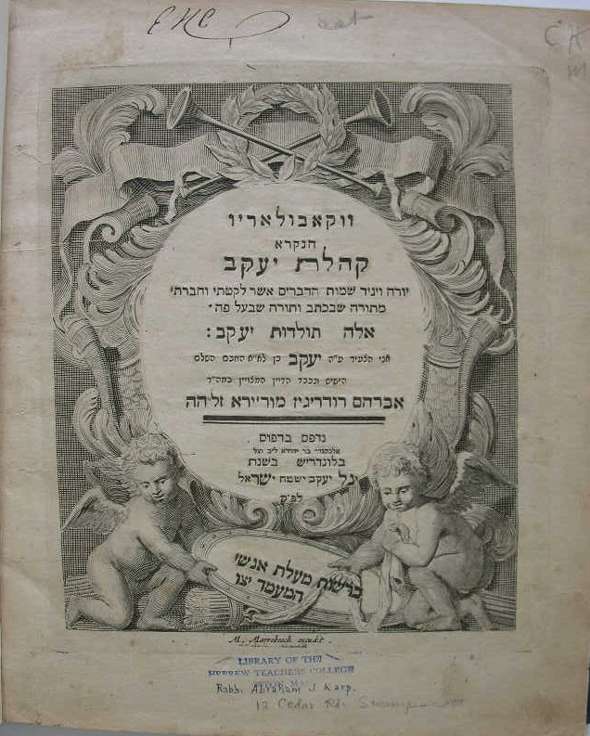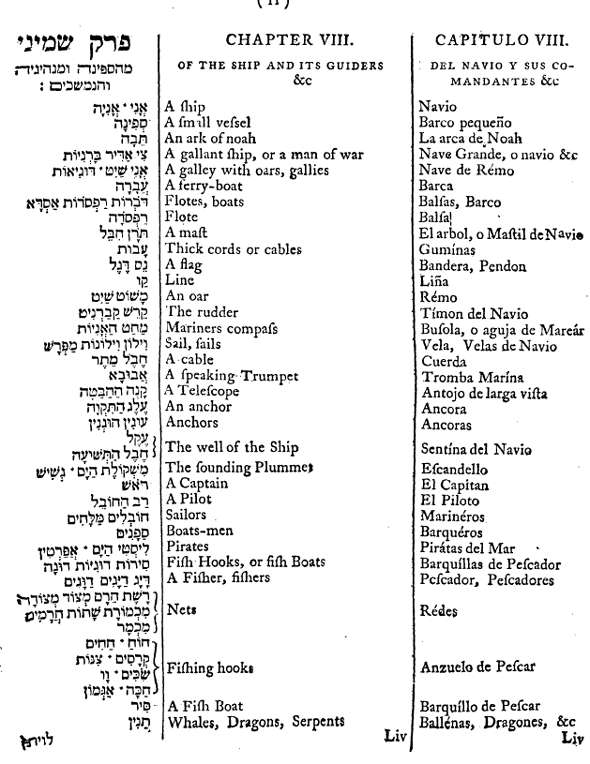The fascinating book ווקאבולאריו הנקרא קהלת יעקב, also titled "Kehilath Jahacob, being a Vocabulary of Words in the Hebrew Language" deserves a series of posts, if not a book-length[1] treatment. Published in London in 1773, this dictionary was compiled by Jacob Rodrigues Moreira. Jacob arranged and carefully pointed Hebrew terms and phrases according to subject, coining new terms where needed. He also translated them into Spanish, while his son Haim translated them into English. The result was this trilingual Vocabulario. In the Preface, he explains that his aim is to aid his children and disciples who have a desire to become "masters of the holy language" and to "increase the knowledge of God's Holy Word" which at present is lacking with many who [only] read Hebrew. He also notes that the reason his work is arranged into 58 sections is because 58 is the numerical value of the Garden (הגן) and to call to mind the first command given to Adam (Gen. 2.16). That is, he wants the reader to eat the fruits of the trees! - enjoy his book.

Like I said, the book (published in 1773) is unspeakably interesting if you're the sort who likes to curl up with a lexicon. Below is the seafaring terms on pg. 11:

As you can see, in 1773 sea terms needed to include terms for oar, rudder, compass, telescope, anchor and pirates. For the latter term, Rodrigues Moreira used ליסטי הים or אפרטין. Both good choices. אפרטין is a rare rabbinic Hebrew term meaning "sea robber," and presumably derived from the same Greek source as the word pirate itself (see Yalkut Shim'oni to Lev. 19:23). Incidentally many people surmise that the rabbinic Hebrew term for bandit ליסטים is the plural, meaing bandits (see the first Rashi on the Torah). But if so, what is its singular? Uhhh. As Rabbi Elijah Levita correctly notes in his Tishbi, the Greek term from which the Hebrew is derived is ליסטיס and that is also the proper singular form in Hebrew. When pluralized the final ס was dropped and a נ is added, making ליסטין, a proper rabbinic Hebrew plural. That many (most?) texts today read ליסטים is a mistake. ס looks like ם. Thus Moreira took ליסטים as the plural, which he would not have done if he'd realized that ליסטיס is the singular. His neologism then would have read ליסטיסי הים, if not ליסטין הים. Or not. In any event, his term is ליסטי הים.
But I digress.
When it comes down to it, so much of the book is devoted to modern terms that one is left to wonder how it is that he expected the book to really increase the ability of students to comprehend Hebrew writings more so than to write new ones themselves. The book includes terms for lemonade, umbrella, a gift to a harlot, "the f[emale] secret part," itchy nose, sore throat, lawyer (תורני), Indian cane, pea soup, clean meat (בשר כשר), fourteen separate terms for "wine," wax candle, tallow candle, blunderbuss, tobacco leaves - in short, I could go on and on but it's in reality a word list for life in the 18th century.
After the categories are exhausted (and I mean exhausted) the final chapters include various appendices. For example, the 50th sections lists all the Shofetim (Judges) over Israel and the years of their reign. It also lists various converts to Judaism, beginning with Jethro and ending with Herod and Agrippa.
Chapter 55 deals with numbers and the calendar. Chapter 57 ("Of Titles of Honor") tells us how to address various classes of people: a king, a prince, a duke, a pope, a gentleman, and so forth (all in Hebrew, English and Spanish). Perhaps he had a sense of humor, for the chapter continues to instruct what sounds animals make (e.g., the Hog grunts = חזיר מלגלג). The final, 58th chapter is an imaginary dialog between the author and his son.
[1] I refuse to use the word "monograph." Or "desideratum," or "efflorescence." The book was discussed from the Spanish language point of view in a three part article called "Castellano, judeoespañol y. portugués: el vocabulario de Jacob Rodrígues Moreira y los sefardíes londinenses" by Kenneth Adams in Sefarad 26-27 (1966-67), but obviously that's not the angle I'd still like to see studied.





"how would you write "pirate" in Hebrew if it was 1773 and you needed to?"
ReplyDeleteso, רב החובל?
;)
"the f[emale] secret part" -- So what's the word?
ReplyDeleteCut right to the chases, huh? It's on Hebrewbooks! Just look it up - pg 28.
ReplyDeleteAnyway, it's פות.
I didn't mention the entry for "a man's Yard."
Josh, how about בעל תוכיע? ;-)
Oh, as in Isaiah 3. (Or is it 4?) ויי פתהן יערה
ReplyDeleteCorrect.
ReplyDeleteVarious comments:
ReplyDelete1) I thought, at least according to the Rambam, there WAS no hebrew word for female parts, secret or otherwise. (Likewise, male yards.)How would he explain this?
2)Somewhere in his "Makor Baruch", R. B. Epstein cites some cockamamie suggestion I guy came up with for the word telescope, based on two pesukim desscribing things appearing large and small. I think the Spies verse was one of them, forgot the other.
3) Re different animal sounds - Rashi Psalms 42:1
There is a wonderful translation by Al Grand of Gilbert and Sullivan's "The Pirates of Penzance." The new title is "Di Yam-Gazlonim."
ReplyDeleteyou made my husband'sday
ReplyDeletethe Israelis say all such words are available in Arabic (Semitic roots)
DF,
ReplyDelete1) I guess he would say that the word if itself a euphemism. Maybe a bit lame, but certainly if the English word for the female secret part was "secretpart" you could say that English had no word for it. The Rambam's point is not that you can't figure out a way to use Hebrew to say anything you want, but that the vocabulary that is known to us is wanting in vulgar terms.
Thank you Minda.
Do we know if Eliezer Ben Yehudah knew of the existence of this work?
ReplyDeleteHe must have. It's in all the bibliographies of Hebraica.
ReplyDeleteNow that you bring it up, I wonder if he ever cites it in the Milon, or if he adopted any of the neologisms in this book.
I dont know. קבר is a euphemism, that we know. So is אמה and so is גיד . But how is פות a euphemism? What else does it mean, beside for femalesecretpart? [ Agav, פות sounds similar to pudenda.]
ReplyDeleteAccording to Strong, the root means open, or space. He gives another example, 1 Kings 7:50. So I guess the Rambam would see it as if the English word for female secret part was "orifice." I mean, at a certain point we have to realize that this is just how the Hebrew language is constructed and you can presumably do the same thing with any triliteral language, but I imagine this is what the Rambam would say.
ReplyDeleteOr . . . he overlooked this word.
Agav, if you say it like an Ashkenazi is sounds like the American euphemism for, uh, cat.
"Agav, if you say it like an Ashkenazi is sounds like the American euphemism for, uh, cat."
ReplyDeleteSnicker and chortle!
Does this chapter on maritime terms go on to discuss insignificant items like "chart", "astrolabe", "compass", "navigation"--you know, the things that get the vessel from point A to B and back?
ReplyDeletepirate in hebrew is shoded yam
ReplyDeleteIt might also be pointed out that פות bears an uncanny resemblence to "puta," Spanish for "zonah."
ReplyDelete